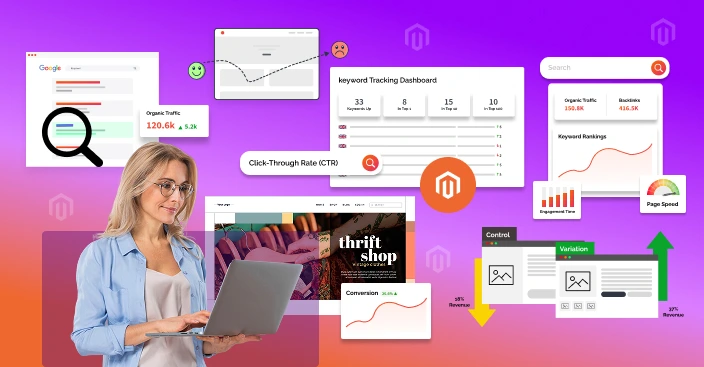Magento SEO Guide 2025: Optimise Your E-commerce Site for Maximum Reach

Table of Contents
It’s thrilling to have an online business, but it may be challenging to get consumers to find your products. SEO, or search engine optimisation, is useful in this situation.
If your e-commerce site is powered by Magento, you’re at the right place. But if you want to maximise its benefits, you need to focus on Magento SEO optimisation.
In 2025, SEO is no longer optional; it’s a must. Customers turn to Google every day to search for products, and if your store doesn’t show up in the results, they’ll never even know you exist.
Over 68% of online experiences begin with a search engine. This guide is for store owners, marketers, and even developers who want to improve SEO in Magento, without all the fluff or technical jargon.
Why Magento SEO Matters More Than Ever
Magento (also known as Adobe Commerce) is a strong and flexible platform. It’s built for businesses that want to grow online. But here’s the thing: just launching your Magento store isn’t enough.
Think about opening a beautiful shop in a quiet alley; if people don’t know where it is, it won’t attract any customers. SEO is analogous to putting your business on the main road, with large, obvious signage that attracts the correct customers.
When you take SEO seriously, your store gets:
- More visibility on Google
- Better quality traffic (people already looking for what you sell)
- Higher chances of making sales
However, Magento SEO must be done correctly, and we’re here to explain everything in an understandable manner.
What is SEO optimisation for Magento?
Magento SEO optimisation is the process of making changes to your shop that will help Google (and other search engines) understand, rank, and promote your pages.
- Clean URLs
- Flexible metadata
- Mobile-responsive themes
- Speed and performance settings
- Ability to use extensions for SEO
But all of these features must be configured appropriately Unless they hire a Magento development business or a Magento-certified developer to assist them, that is where a lot of store owners end up trapped.
Easy Methods to Upgrade Magento SEO
Let’s look at practical things you can do—without getting overwhelmed by tech talk.
1. Fix Your URLs
Make sure your product and category URLs are clean and readable.
Good: example.com/women/black-leather-bag
Bad: example.com/index.php?id=44&cat=1234
You can change URL settings from Magento’s admin panel.
2. Make sure your names and descriptions are read correctly
Be it a blog, product, or category, every page needs its meta title and description.
Avoid copying and pasting the same content onto each page. Don’t copy and paste the same thing on every page. Include some natural keywords (such as the product name or Magento ecommerce SEO) together with a description of the product and the target audience.
3. Add Keywords, But Don’t Stuff Them
Let’s say you sell running shoes. Your product page should naturally include terms like:
- “men’s running shoes”
- “comfortable sports shoes”
- “lightweight sneakers for jogging”
To determine what people are searching for, utilise tools like Google Keyword Planner. Sprinkle them lightly, but not forcefully.
4. Improve Your Site Speed
Slow sites make visitors leave and hurt SEO rankings. A 1-second delay in load time can reduce conversions by 7%. Magento lets you improve performance using:
- Caching
- Image compression
- Fast hosting
If that sounds technical, a Magento web development team can help get this sorted.
5. Make It Mobile-Friendly
More than half of online shopping happens on phones now. Your Magento theme should adjust nicely to smaller displays. Most latest themes are responsive, but you should test them yourself to be sure.
6. Use Internal Links
Let’s say you write a blog about fitness gear. Inside that post, link to your “yoga mats” or “resistance bands” category page. It helps search engines understand how your pages connect.
Technical SEO: A Few Things to Check
You don’t have to be a developer to understand these basics:
- Sitemaps: Canonical URLs: Use canonical tags to prevent duplicate content issues if your product is listed in multiple categories. Duplicate content can negatively impact SEO and affect up to 30% of eCommerce pages.
- Robots.txt: Search engines are instructed by the Robots.txt file to ignore certain websites, such as administrative pages.
- Canonical URLs: Use canonical tags if your product appears in many categories to avoid duplicate content problems.
To make sure everything goes according to plan, turn to a Magento agency in London or your city.
How Content Boosts Magento SEO
Don’t just list products, create helpful content. For example:
- A guide on “How to Choose the Right Winter Jacket”
- A blog about “Top Trends in Home Decor 2025”
- Product comparisons, tutorials, or user stories.
This increases client confidence and helps you rank for keywords other than product names. You can use extensions or custom modules to add blogs if you’re using Magento.

Best Magento SEO Extensions for 2025
You don’t need to do everything manually. Here are a few popular tools to help:
- Mageworx SEO Suite – Great for automating meta tags and managing sitemaps
- Amasty SEO Toolkit – Helps fix duplicate content, adds rich snippets
- SEO Ultimate Magento – All-in-one toolkit for on-page SEO
You can adhere to SEO best practices and save time by using one of these tools instead of hiring more employees.
What a Magento Development Agency Can Do for You
Not everyone has the time or skill to do SEO themselves. That’s why many businesses work with a Magento development agency.
A good agency will:
- Set up technical SEO the right way
- Help write or review your content
- Speed up your store
- Customise themes for a better user experience
- Keep up with algorithm updates
If you live in the United Kingdom, collaborating with a Magento firm in London provides you with the extra benefit of local SEO methods, which is useful if you want to target clients in your area.
Magento E-commerce Trends Shaping SEO in 2025
To stay ahead, you need to follow magento eCommerce trends that are shaping SEO in 2025. Here’s what’s big this year:
1. Voice Search Is Growing
Voice assistants are being used by more individuals. For example, “which running shoes are best for flat feet?” Make sure your content is optimised for “how,” “what,” and “where” searches.
2. AI- Recommendations
Magento now supports smart product suggestions. But SEO still matters—especially for bringing people to the right product pages to begin with.
3. Core Web Vitals Matter More
Google is interested in how your site performs, how quickly it loads, how fluid it seems, and how engaging it is.
4. Visual Search Is on the Rise
High-quality images and proper tagging help your products show up in Google’s image results. Visual search is projected to drive 30% of eCommerce revenue by 2025.

Tracking Your Magento SEO Success
Here’s how to see if your efforts are paying off:
- Utilise Google Analytics to view sales and traffic.
- Google Search Console may be used to see what terms users are using while
- Use tools like as Ahrefs or Semrush to keep track of keyword rankings.
- Set small goals, such as improving and upgrading your organic traffic by 20% over the next three months.
Common SEO Errors in Magento (And How to Avoid Them)
Product descriptions copied and pasted
Write unique content, even if products are similar.
Forgetting mobile
Always test your store on phones and tablets.
Skipping regular updates
SEO is not a one-day job that you can do one day and expect results instantly. It takes months of hard work to see the results of your hard work. Continue to refresh your content and refine the technical aspects.
How Much Does Magento SEO Cost?
If you DIY it, your only cost is time. But hiring pros?
- Basic SEO audit: $500–$1,000
- Depending on the size of your shop, monthly SEO services might go from $1,000 to $4,000.
It can seem like a lot, but the advantages, increased income, greater visitors, and better visibility, make it all worthwhile.
Conclusion
Even for a non-technical background, SEO is rather manageable if you know the proper techniques, despite its daunting appearance. Magento gives you the tools to raise your store’s rating and revenue with a little perseverance and smart choices.
Hiring a trained magento programmers or collaborating with a Magento development business might help your shop expand if you’re not sure where to begin.
Connect with a trustworthy Magento agency in London to help you increase your rankings. Now is the time to engage in SEO optimisation to produce actual results.
FAQs
 What are the key SEO benefits of using Magento?
What are the key SEO benefits of using Magento?
Because it offers you a great deal of flexibility, Magento is excellent for SEO. You have the ability to modify the structure of your website, make unique URLs, add schema markup, and change the meta tags on each page. Along with built-in features like XML sitemaps and canonical tags, it also enables designs that are optimised for mobile devices. It basically offers all the tools you need to create an online store that is search engine-friendly, as long as you take the time to properly configure it.
 How can high-quality web hosting improve the SEO performance of my Magento site?
How can high-quality web hosting improve the SEO performance of my Magento site?
Dependable, quick hosting has a significant impact. Slow websites annoy search engines and your consumers. Both rankings and sales may suffer if your Magento store loads slowly. A competent web host can increase page performance, minimise downtime, and manage traffic spikes with ease. All of this enhances the user experience, and Google is aware of this.
 What role does HTTPS play in the security and SEO of a Magento website?
What role does HTTPS play in the security and SEO of a Magento website?
Not only does HTTPS keep your website safe, but it also affects its rating. Google favours secure websites, and the majority of browsers now mark non-HTTPS websites as “Not Secure.” That’s not a good online store appearance. By adding an SSL certificate to your Magento store, you can improve Search Engine Optimization, foster trust, and safeguard consumer data.
 How can I optimise meta titles and meta descriptions for better Magento SEO?
How can I optimise meta titles and meta descriptions for better Magento SEO?
Make the most of your meta title, which is what search engines view initially. Stay under 60 characters, be clear, and include your primary keyword. Consider the meta description as an advertisement. Aim for less than 160 characters, add a keyword or two, and explain the purpose of the site. Don’t forget to use the admin panel to simply modify them in Magento!
 What are the best practices to enhance search engine crawling on a Magento site?
What are the best practices to enhance search engine crawling on a Magento site?
To help search engines crawl your site better, make sure to:
- Submit an XML sitemap through Google Search Console
- Use clean, structured URLs
- Avoid duplicate content by using canonical tags
- Fix broken links and redirects
- Keep your robots.txt file updated so search engines can access the right pages. The easier it is for bots to navigate your site, the better your content will rank.
 Why is it important to enable canonical URLs on my Magento website?
Why is it important to enable canonical URLs on my Magento website?
Search engines are informed via canonical URLs which version of a page is the “main” version. Duplicate content problems can arise because Magento businesses frequently offer many methods to access the same product (for example, through various categories). By turning on canonical tags, you keep your Search Engine Optimization from being overly dispersed and assist Google decide which site to rank.



